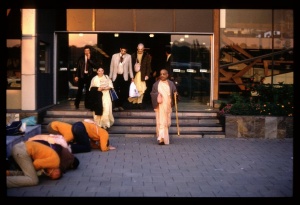SB 9.2.2: Difference between revisions
m (1 revision(s)) |
(Vanibot #0054 edit - transform synonyms into clickable links, which search similar occurrences) |
||
| (One intermediate revision by one other user not shown) | |||
| Line 1: | Line 1: | ||
{{info | {{info | ||
|speaker= | |speaker=Śukadeva Gosvāmī | ||
|listener=King | |listener=King Parīkṣit | ||
}} | }} | ||
[[Category:Srimad-Bhagavatam - Canto 09 Chapter 02|s02 ]] | |||
[[Category:Bhagavatam Verses Spoken by Sukadeva Gosvami - Vanisource|090202]] | |||
<div style="float:left">'''[[Srimad-Bhagavatam]] - [[SB 9|Ninth Canto]] - [[SB 9.2: The Dynasties of the Sons of Manu|Chapter 2: The Dynasties of the Sons of Manu]]'''</div> | |||
<div style="float:right">[[File:Go-previous.png|link=SB 9.2.1]] '''[[SB 9.2.1]] - [[SB 9.2.3]]''' [[File:Go-next.png|link=SB 9.2.3]]</div> | |||
{{RandomImage}} | |||
==== TEXT 2 ==== | ==== TEXT 2 ==== | ||
<div | <div class="verse"> | ||
tato 'yajan manur devam | :tato 'yajan manur devam | ||
apatyārthaṁ hariṁ prabhum | :apatyārthaṁ hariṁ prabhum | ||
ikṣvāku-pūrvajān putrān | :ikṣvāku-pūrvajān putrān | ||
lebhe sva-sadṛśān daśa | :lebhe sva-sadṛśān daśa | ||
</div> | </div> | ||
| Line 17: | Line 22: | ||
==== SYNONYMS ==== | ==== SYNONYMS ==== | ||
<div | <div class="synonyms"> | ||
''[//vanipedia.org/wiki/Special:VaniSearch?s=tataḥ&tab=syno_o&ds=1 tataḥ]'' — thereafter; ''[//vanipedia.org/wiki/Special:VaniSearch?s=ayajat&tab=syno_o&ds=1 ayajat]'' — worshiped; ''[//vanipedia.org/wiki/Special:VaniSearch?s=manuḥ&tab=syno_o&ds=1 manuḥ]'' — Vaivasvata Manu; ''[//vanipedia.org/wiki/Special:VaniSearch?s=devam&tab=syno_o&ds=1 devam]'' — unto the Supreme Personality of Godhead; ''[//vanipedia.org/wiki/Special:VaniSearch?s=apatya&tab=syno_o&ds=1 apatya]-[//vanipedia.org/wiki/Special:VaniSearch?s=artham&tab=syno_o&ds=1 artham]'' — with a desire to get sons; ''[//vanipedia.org/wiki/Special:VaniSearch?s=harim&tab=syno_o&ds=1 harim]'' — unto Hari, the Supreme Personality of Godhead; ''[//vanipedia.org/wiki/Special:VaniSearch?s=prabhum&tab=syno_o&ds=1 prabhum]'' — the Lord; ''[//vanipedia.org/wiki/Special:VaniSearch?s=ikṣvāku&tab=syno_o&ds=1 ikṣvāku]-[//vanipedia.org/wiki/Special:VaniSearch?s=pūrva&tab=syno_o&ds=1 pūrva]-[//vanipedia.org/wiki/Special:VaniSearch?s=jān&tab=syno_o&ds=1 jān]'' — of whom the eldest was named Ikṣvāku; ''[//vanipedia.org/wiki/Special:VaniSearch?s=putrān&tab=syno_o&ds=1 putrān]'' — sons; ''[//vanipedia.org/wiki/Special:VaniSearch?s=lebhe&tab=syno_o&ds=1 lebhe]'' — got; ''[//vanipedia.org/wiki/Special:VaniSearch?s=sva&tab=syno_o&ds=1 sva]-[//vanipedia.org/wiki/Special:VaniSearch?s=sadṛśān&tab=syno_o&ds=1 sadṛśān]'' — exactly like himself; ''[//vanipedia.org/wiki/Special:VaniSearch?s=daśa&tab=syno_o&ds=1 daśa]'' — ten. | |||
</div> | </div> | ||
| Line 24: | Line 29: | ||
==== TRANSLATION ==== | ==== TRANSLATION ==== | ||
<div | <div class="translation"> | ||
Then, because of this desire for sons, the Manu known as Śrāddhadeva worshiped the Supreme Lord, the Personality of Godhead, the Lord of the demigods. Thus he got ten sons exactly like himself. Among them all, Ikṣvāku was the eldest. | Then, because of this desire for sons, the Manu known as Śrāddhadeva worshiped the Supreme Lord, the Personality of Godhead, the Lord of the demigods. Thus he got ten sons exactly like himself. Among them all, Ikṣvāku was the eldest. | ||
</div> | </div> | ||
__NOTOC__ | |||
<div style="float:right; clear:both;">[[File:Go-previous.png|link=SB 9.2.1]] '''[[SB 9.2.1]] - [[SB 9.2.3]]''' [[File:Go-next.png|link=SB 9.2.3]]</div> | |||
__NOTOC__ | |||
__NOEDITSECTION__ | |||
Latest revision as of 23:50, 18 February 2024

His Divine Grace
A.C. Bhaktivedanta Swami Prabhupada
A.C. Bhaktivedanta Swami Prabhupada
TEXT 2
- tato 'yajan manur devam
- apatyārthaṁ hariṁ prabhum
- ikṣvāku-pūrvajān putrān
- lebhe sva-sadṛśān daśa
SYNONYMS
tataḥ — thereafter; ayajat — worshiped; manuḥ — Vaivasvata Manu; devam — unto the Supreme Personality of Godhead; apatya-artham — with a desire to get sons; harim — unto Hari, the Supreme Personality of Godhead; prabhum — the Lord; ikṣvāku-pūrva-jān — of whom the eldest was named Ikṣvāku; putrān — sons; lebhe — got; sva-sadṛśān — exactly like himself; daśa — ten.
TRANSLATION
Then, because of this desire for sons, the Manu known as Śrāddhadeva worshiped the Supreme Lord, the Personality of Godhead, the Lord of the demigods. Thus he got ten sons exactly like himself. Among them all, Ikṣvāku was the eldest.